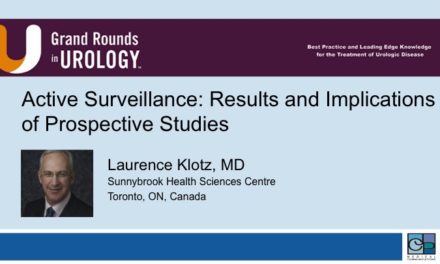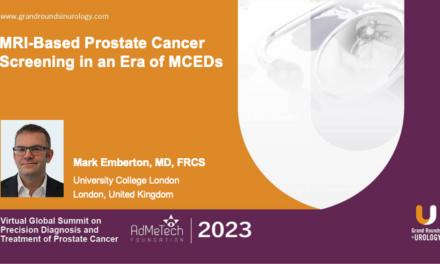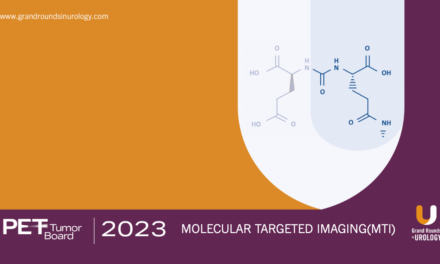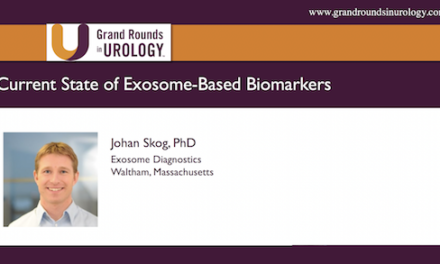Jason A. Efstathiou, MD, DPhil, presented “Pelvic Lymph Node Management: Radiation Approach” during the 35th International Prostate Cancer Update conference on February 9, 2025, in Vail, Colorado.
This content is available free to the GRU Community. Login or create an account to view it.
How to cite: Efstathiou, Jason A. “Pelvic Lymph Node Management: Radiation Approach.” February 9, 2025. Accessed Dec 2025. https://grandroundsinurology.com/pelvic-lymph-node-management-radiation-approach/
Pelvic Lymph Node Management: Radiation Approach – Summary
Jason A. Efstathiou, MD, DPhil, Harvard University, Boston, Massachusetts, examines the role of radiation therapy in managing pelvic lymph nodes in prostate cancer.
In this 17-minute presentation, Dr. Efstathiou reviews key randomized trials assessing radiation fields, highlighting conflicting results regarding whole pelvis radiation’s benefit in high-risk prostate cancer.
Dr. Efstathiou shares that while some studies show no advantage in whole pelvis radiation, a single-center trial from India suggests improved outcomes in patients with a high risk of nodal involvement. He emphasizes the importance of ongoing trials like RTOG 0924, which may provide clearer guidance. He highlights recent evidence showing improved progression-free survival with pelvic nodal radiation in post-prostatectomy salvage settings.
PET imaging has become crucial in treatment planning, with data showing it frequently alters radiation field designs. Dr. Efstathiou addresses the emerging role of biomarkers such as the PORTO score, which may help identify patients who would benefit from pelvic nodal radiation. In cases of oligometastatic recurrence, studies suggest elective nodal radiation may be superior to targeted SBRT, particularly when limited lymph nodes are involved.
A multidisciplinary approach is essential to personalize patient treatment strategies, guiding decisions on radiation field design and systemic therapy, and incorporating advanced imaging and genomic tools.
About the 35th International Prostate Cancer Update:
The International Prostate Cancer Update (IPCU), is a multi-day, CME-accredited conference focused on new developments in prostate cancer treatment, diagnosis, and prevention. IPCU 35 will feature lectures, interactive discussions, panel roundtables, debates, and case reports. This conference is led by expert physicians and is designed for urologists, medical oncologists, radiation oncologists, and other healthcare professionals involved in the diagnosis and treatment of prostate cancer.
The goal of this educational program is to equip healthcare professionals involved in the diagnosis and treatment of prostate cancer with the up-to-date clinical knowledge and tools they need to best treat their patients. The program will discuss the treatment of prostate cancer from diagnosis to treating advanced and metastatic disease. The conference aims to give physicians exposure to a comprehensive review of treating prostate cancer patients and to give them a chance to discuss the issues with peers and experts. You can learn more about the conference here.
ABOUT THE AUTHOR
Jason A. Efstathiou, MD, DPhil, is Professor of Radiation Oncology at Harvard Medical School (HMS) as well as Director of the Genitourinary (GU) Division in the Department of Radiation Oncology and Clinical Co-Director of the Claire and John Bertucci Center for GU Cancers at Massachusetts General Hospital. He is a recognized leader in the fields of GU malignancies and radiation oncology. Dr. Efstathiou holds a BS from Yale University, an MD from Harvard Medical School, and a DPhil from the University of Oxford. He completed his residency training through the Harvard Radiation Oncology Program.
Dr. Efstathiou’s research has informed clinical guidelines and made novel contributions to innovations such as organ preservation therapy for bladder cancer, technology assessment of proton beam therapy for prostate cancer, indications for and adverse effects of androgen deprivation therapy for prostate cancer, improving radiation therapy for testicular cancer, and global oncology outreach efforts.
In addition to his educational work and his patient care, Dr. Efstathiou holds leadership positions within cooperative groups and professional societies




